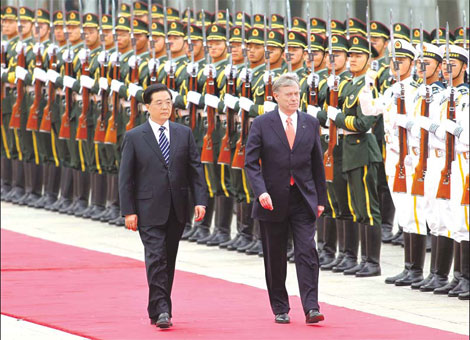German pavilion promotes urban balance
|
President Hu Jintao meets his German counterpart Horst Kohler in Beijing on Monday. Photo by Xu Jingxing / China Daily |
"Balancity", the name of Germany's national pavilion at the Shanghai Expo is intended to highlight a city in balance, said Michael Schaefer, German ambassador to China.
"We want to share our experience as well as our vision of a balanced and sustainable urbanization," he said.
Since the pavilion opened on May 1, tens of thousands of visitors have been excited by its intriguing features, said the ambassador.
"The philosophy of our pavilion becomes clear: Our city can be a good place to live - provided there is a balance between renewal and preservation, tradition and innovation, urbanity and nature, community and individual development, work and leisure. We all can contribute to make it a better place," he said.
The German pavilion and the German-Chinese House (part of "Germany and China - Moving Ahead Together" program) stress the interactive nature between urban planning and individual citizens.
"In both cases, interactive games give our visitors the chance to participate in the creative process of urbanization. Each of us has an individual responsibility to contribute to making our cities a better place where we, our children and grandchildren, will be able to enjoy life and where we can live and work in a healthy, balanced environment," he said. "Our message is: sustainable urban development is possible, if everyone contributes: governments, experts and every citizen."
As part of the "Germany and China - Moving Ahead Together" program Germany has organized dialogues, conferences, exhibitions, and seminars around the theme of sustainable urban development, bringing together hundreds of experts, government officials, and ordinary citizens, exchanging views, sharing visions and solutions for the challenges of urbanization, thus paving the way for a longstanding, sustainable partnership between the two countries, he said.
The ambassador said that President Horst Kehler will schedule in a visit to the Expo. "The highlight will be the President's participation in the National Day of Germany at the World Expo."
The ambassador said he believes Germany is one of the countries with the most advanced environmental technologies in the world.
China and Germany are interested in cooperating in key areas like energy saving and efficiency, and use of new and renewable energies.
During his visit to China, German Federal Environment Minister Norbert Roettgen said Germany will strengthen its cooperation in the areas of managing chemicals, plant safety, waste water and circular economy with China.
New Sino-German projects in the area of low carbon economy will be put into action, according to the ambassador. An example of the current cooperation is the low carbon chemical facilities of BASF-YPS Co Ltd, which is currently expanding to an investment of $1.4 billion in China.
"In China, most people will continue to dream of a car as most Germans have done a few decades ago," he said. "That is why we must make maximum use of the technological progress, which may offer new solution in the next few years to come."
The answer to lead energy efficient lives and e-mobility lies in structural changes of our living habits, said the ambassador.
"E-mobility, alternative energies, and low carbon technologies will open doors for us which had been closed so far. E-cars will reduce pollution within our cities, renewable energies will reduce CO2 emissions in energy production, clean carbon technologies will help countries like China which continue to be heavily dependent on coal to reduce their carbon emissions," he added.
(China Daily 05/19/2010 page15)















